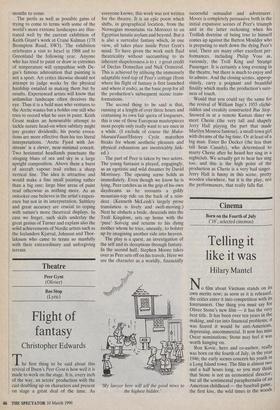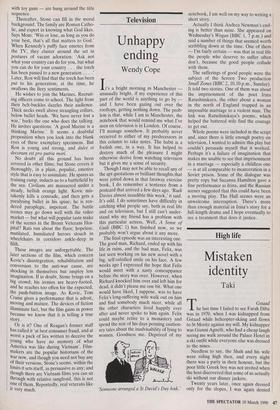Cinema
Born on the Fourth of July (`18', selected cinemas)
Telling it like it was
Hilary Mantel
o film about Vietnam stands on its own merits now; as soon as it is released, the critics enter it into competition with its forerunners. One thing you must say for Oliver Stone's new film — it has the very best title. It has been over ten years in the making, and ran into financial problems; it was feared it would be anti-American, depressing, uncommercial. It now has nine Oscar nominations; Stone may feel it was worth hanging on.
Ron Kovic, hero and co-author, really was born on the fourth of July, in the year 1946; the early scenes concern his youth in a Long Island town. The film is almost two and a half hours long, so you may think that Stone is not an economical director; but all the sentimental paraphernalia of an American childhood — the baseball game, the first kiss, the wild times in the woods with toy guns — are hung around the title sequence.
Thereafter, Stone can fill in the moral background. The family are Roman Catho- lic, and expert in knowing what God likes. Says Mom: 'Win or lose, as long as you do your best, that's all that matters to God.' When Kennedy's puffy face emotes from the TV, they cluster around the set in postures of vacant adoration: 'Ask not what your country can do for you, but what you can do for your country . . . the torch has been passed to a new generation . . . Later, Ron will find that the torch has been put to his generation; at the time, he swallows the fiery sentiments.
He wishes to join the Marines. Recruit- ing officers come to school. The light from their belt-buckles dazzles their audience. Thick necks swell above strangling collars, below bullet heads. 'We have never lost a war,' barks the one who does the talking. He invites questions: 'A good Marine is a thinking Marine.' It seems a doubtful proposition when you look into the blank eyes of these exemplary specimens. But Ron is young and strong, and dulce et decorum est pro patria mori.
No doubt all this ground has been covered in other films; but Stone covers it thoroughly, in a plain, populist, emotive style that is easy to assimilate. He spares us training camp, inducts us to a battlefield by the sea. Civilians are massacred under a steady, hellish orange light. Kovic mis- takenly kills a comrade, and then gets a paralysing bullet in his spine; he is ren- dered paraplegic, impotent. The battle scenes may go down well with the video market — but what will popular taste make of the scenes in the Bronx Veterans Hos- pital? Rats run about the floor; hopeless, mutilated, humiliated heroes slouch in wheelchairs in corridors ankle-deep in filth.
These images are unforgettable. The later sections of the film, which concern Kovic's disintegration, rehabilitation and conversion to the anti-war cause, are shocking in themselves but employ less imagination. If in doubt, Stone brings on a big crowd; his ironies are heavy-footed, and he reaches too often for the expected, the push-button image. As Kovic, Tom Cruise gives a performance that is adroit, moving and mature. The devices of fiction illuminate fact, but the film gains in power because we know that it is telling a true story.
Or is it? One of Reagan's former staff has called it 'at best consumer fraud, and at worst a pack of lies written to deceive the young who have no memory of what America was like during Vietnam'. Film- makers are the popular historians of the war now, and though you need not buy any of their versions, Stone's seems, within the limits it sets itself, as persuasive as any; and though there are Vietnam films you can sit through with relative sangfroid, this is not one of them. Reportedly, real veterans like it very much.



























































 Previous page
Previous page